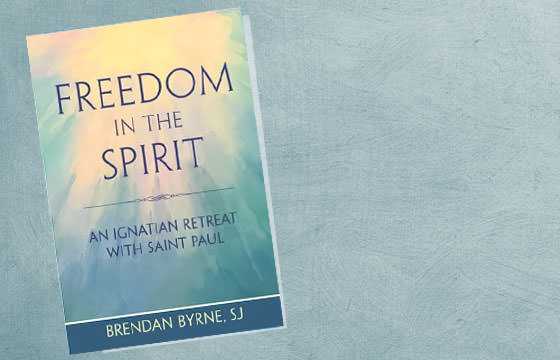
Fr Brendan Byrne, SJ, Freedom in the Spirit: An Ignatian Retreat with Saint Paul, Paulist Press, 2016 ISBN 978 0 8091 4994 0.
I confess that I came to Freedom in the Spirit without great enthusiasm. In my prayer and preaching I find more life in the stories and images of the Gospels than in the discursive texts. Because St Paul’s letters are light on stories I leave them aside.
But I found myself first held and then excited by Fr Byrne’s Ignatian Retreat with St Paul. He has read Paul’s letters so closely and often that he can scratch what you and I would take to be dead stumps and reveal the sap and shoots concealed.
The unexpected gift of the book was the discovery of Paul as a dramatist who presents God’s action, our human actions and Christ’s death as part of a large play in which readers are invited to play their part in response.
The dramatic character of Paul’s writing and the response it demands is heightened by setting Paul’s thought within the context of St Ignatius’ Spiritual Exercises.
Fr Byrne shows how Paul’s writing is constantly grounded in the Old Testament stories, particularly those of creation and of Adam’s sin. Paul sees the selfishness and demand for complete autonomy free from the claims of relationships as a destructive power that only God can combat.
God’s response is to send his son to conquer sin by offering, through self-sacrifice, reconciliation in our relationships with God and one another. Thus human selfishness is overcome by God’s selflessness. We are then invited through our faith in Christ’s death and rising to live like him and share the joy of that life with others.
Like all good books, Freedom in the Spirit invites the reader to see connections with apparently unrelated things. It sparks associations, for example, with the monks of the desert, whose mission was to win over others and whose weeping for their sins was an expression of joy.
Pope Francis, who seems to work instinctively from stories, also displays a natural dramatic sense in his conversation and symbolic gestures, also echoes Paul’s vision of faith. He consistently speaks of a God who has shown compassion to human beings in our sinfulness, and urges Catholics, in their joy at finding a compassionate God, to go out compassionately to others so they may share the Good News. Perhaps the dramatic connection that Francis, following Paul, makes between sin, reconciliation and joy lies at the heart of the differences that separate him from the Catholic critics of Amoris Laetitia.
When they think of sin, they see individual sins that in Christian living need to be identified, acknowledged, forgiven and corrected by God’s grace. They think of an accounting. The Good News Christ brings is that we can live faithfully. To allow people who continue in sinful actions to receive communion would short-circuit the workings of the Gospel.
Francis’ Pauline view of sin as a power from which God has rescued us by Christ’s selfless love puts the priority in Christian life on sharing with others the joy of the Gospel. The Good News Christ brings is that we have been freed by God’s compassion. When people are touched by compassion they may be free to study the grammar of living faithfully. Seen within the big picture, small inconsistencies do not matter so much.
The gift of Freedom in the Spirit is to draw us into Paul’s dramatic big picture and to muse on how we might respond in the Church and world of our own day.